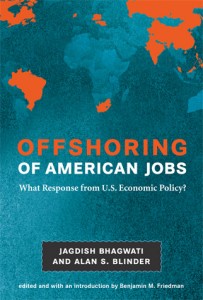Debating Offshoring’s Impact
 Too often, discussions of contemporary economic issues end up either overly simplified for popular consumption — or too jargony and technical to be followed by anyone but economists. A new book, Offshoring of American Jobs: What Response from U.S. Economic Policy? avoids both extremes — and instead finds an informative, nuanced middle ground on an important issue. This brief but thought-provoking book offers insights into economists’ thinking about offshoring.
Too often, discussions of contemporary economic issues end up either overly simplified for popular consumption — or too jargony and technical to be followed by anyone but economists. A new book, Offshoring of American Jobs: What Response from U.S. Economic Policy? avoids both extremes — and instead finds an informative, nuanced middle ground on an important issue. This brief but thought-provoking book offers insights into economists’ thinking about offshoring.
In the book, edited by Benjamin M. Friedman of Harvard and published by MIT Press, two prominent economists —Jagdish Bhagwati of Columbia University and Alan Blinder of Princeton — debate the impact that the offshoring of jobs (particularly white-collar jobs, such as computer programming) will have on the American economy. (The book includes commentary from other economists, as well.)
Bhagwati complains of “episodes of media frenzy” despite economists’ consensus about the benefits of free trade, while Blinder worries about the impact of offshoring of service jobs on the American populace and American politics. Here’s a small sample of what each has to say in Offshoring of American Jobs:
BHAGWATI: “In an op-ed titled ‘Technology, not Globalisation, Is Driving Wages Down’ in the Financial Times (January 4, 2007), I argued that the vast numbers of empirical studies…had shown that trade with poor countries had a negligible impact on our workers’ absolute real wages (as against the relative wages of the skilled and the unskilled)….The New Democrats who continue to believe nonetheless in this imaginary downside of free trade are not doing anyone any good.”
BLINDER: “I can’t help believing — and this is what makes me a worrywart rather than a relaxed, business-as-usual guy — that the gross job losses [from offshoring] in the rich, English-speaking countries will a) continue for decades, b) eventually be huge, c) pose a variety of difficult adjustment problems and d) dominate the political landscape for years.”
Whatever your own views on offshoring and its economic and political impact, chances are good you’ll learn something from the discussion presented in this book.




